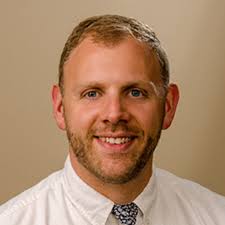Dr. Joshua Denson
Assistant professor of medicine, Section of pulmonary, critical care and environmental medicine

Areas of Expertise
Biography
Dr. Joshua Denson is a pulmonary and critical care medicine physician working primarily in the medical intensive care unit (ICU), where all COVID-19 patients are admitted if critically ill. He diagnosed and cared for the first critically ill COVID-19 patient in Louisiana and continues to care for these very ill patients often suffering from the disease process known as ARDS (Acute Respiratory Distress Syndrome). He has trained and worked in ICU's around the country caring for hundreds of similar patients. With these experiences and his specialty training in both pulmonary and critical care medicine, he can provide expert advice on the advanced ventilator techniques, novel medical management strategies, and ICU resource allocation patterns required to keep COVID-19 patients alive.
In his role as a healthcare delivery scientist, he has a nationally recognized expertise in ICU outcomes research as it relates to the delivery of care for critically ill patients in the hospital. He has specific knowledge of both what to expect during a hospitalization as well as the potential for long-standing physical and emotional challenges seen by patients and their caregivers after leaving the hospital. He is an active participant nationally in the American Thoracic Society and the American College of Chest Physicians.
Education
Tulane University
National Jewish Health
University of Colorado
New York University
Tulane University
Tulane University
Articles
Dr. Joshua Denson's Bibliography
Dr. Joshua Denson's Bibliography (2013-present)
Media Appearances
Drug trials, fewer ventilators: here's how Louisiana’s coronavirus treatments have evolved
Louisiana physicians faced a troubling scenario in early March when coronavirus patients started appearing in the state’s intensive care units: no one could say for sure how best to treat them.
Frontline worker to discuss changes at home amid pandemic
Our health heroes are doing their best to keep their communities safe! Frontline workers have been giving it their all, especially since this pandemic began almost two months ago.
COVID-19 Recovery Time: How Long Coronavirus Symptoms Last
COVID-19 recovery time and symptoms can vary by person, but people who’ve had it often describe feeling like a mild cold is coming on before being hit with a fever, a dry cough, and shortness of breath. In short, it can be a slow-burning infection. However, others are asymptomatic or experience other symptoms, such as diarrhea, fatigue, a sore throat, a runny nose, and a headache. What is the recovery time for coronavirus?
Doctors Reveal Coronavirus Symptoms Usually Linger As A 'Slow Burn'
Coronavirus affected hundreds of thousands of Americans all across the United States. Because of the high number of patients, doctors start to see patterns, especially on how the coronavirus symptoms manifest in patients.
How does coronavirus kill? Clinicians trace a ferocious rampage through the body, from brain to toes
On rounds in a 20-bed intensive care unit one recent day, physician Joshua Denson assessed two patients with seizures, many with respiratory failure and others whose kidneys were on a dangerous downhill slide.
'No miraculous recovery': Some ICU doctors say hydroxychloroquine isn't helping sickest patients
The federal government's guidance on emergency usage of the antimalarial drug hydroxychloroquine for COVID-19 patients may have actually set the medication up for failure.
A crisis within a crisis’: Black Americans face higher rates of coronavirus deaths
At first, COVID-19 did not seem to discriminate. The patients who walked into Dr. Uché Blackstock’s urgent-care clinics in Brooklyn, N.Y., with coughs and fevers were white, black and brown.
‘Nothing Works’: Hospitals Race To Train More Docs To Operate Ventilators
With COVID-19, it’s one step forward, two steps back. That’s what doctors battling the devastating viral lung infection on its frontlines are saying, as hospitals face shortages not only in ventilators to keep patients alive, but in doctors to operate them.
In Louisiana, coronavirus death toll mounts
COVID-19 has moved quickly across Louisiana, killing hundreds and infecting thousands of all ages and walks of life in the Pelican State. Among the dead this last week: A 46-year-old registered nurse, a 33-year-old member of Gov. John Bel Edwards’ staff and 85-year-old Ellis Marsalis Jr., the renowned Jazz patriarch.
Critical Care Doc Says Trump Should Stop Trying To Kill Obamacare In The Middle Of A Pandemic
A pulmonary and critical care physician at Tulane Medical Center said if it were up to him, he wouldn’t be pursuing a lawsuit to dismantle the Affordable Care Act in the middle of a health crisis, as the Trump administration is doing.
Some coronavirus patients feel better before getting really sick, doctors say
Some coronavirus patients start feeling like they’re on the mend before becoming severely ill, according to doctors on the frontlines.
Next coronavirus epicenter is likely New Orleans, Tulane hospital physician says
New Orleans is likely the next epicenter of the coronavirus pandemic, Tulane Medical Center's critical care physician Dr. Joshua Denson said Thursday.
New Orleans is a center of coronavirus. Mardi Gras could be to blame, doctors say.
Health experts say it's no surprise that New Orleans is the center of the coronavirus crisis in hard-hit Louisiana after over a million people flocked to the city to celebrate Carnival for more than a month, culminating in Mardi Gras at the end of February.
Who's getting sick from coronavirus? Adults of all ages, and people with chronic health problems
As a growing number of Americans are being diagnosed with the coronavirus, doctors are learning more about who may be most susceptible to the most severe complications of the disease.

